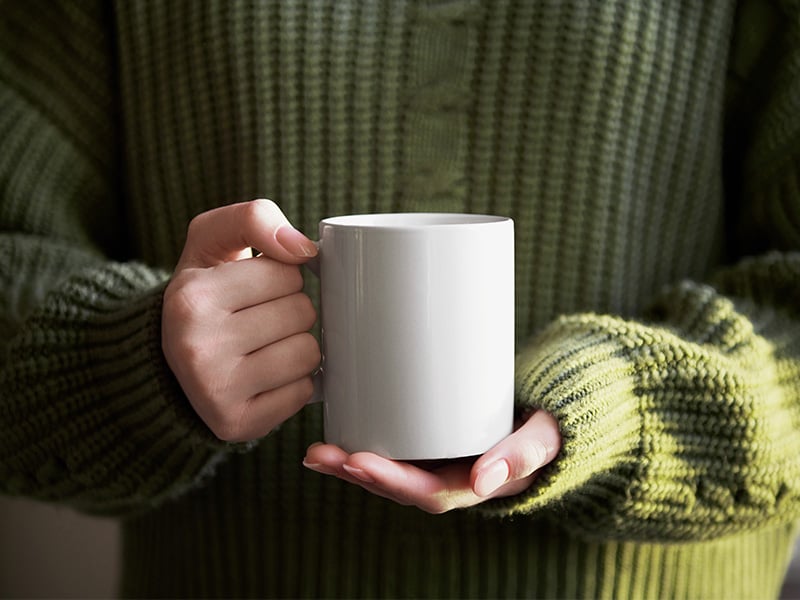Tea and coffee are the UK's most popular hot drinks, and more and more people are now choosing decaffeinated (decaf) options. But is decaf better for you?
What's on this page
What are decaf coffee and decaf tea?
Caffeine is a natural chemical (or drug) found in regular tea and coffee. It stimulates the central nervous system and brain, helping you feel more alert and less tired. That's why many of us reach for a cup in the morning or during an afternoon slump.
Decaf tea and coffee have gone through a process to remove most of the caffeine, but they are not completely caffeine-free.
How much caffeine is in decaf coffee and tea?
Decaf coffee has about 93 per cent less caffeine than regular coffee, with around 7mg of caffeine per 200ml cup, compared to 100mg in a cup of regular coffee.
Decaf tea should contain 96 per cent less caffeine than regular tea, around 2mg per 200ml cup, compared to 50mg in regular tea.
For most people, up to 400mg of caffeine per day is safe.
Herbal teas such as peppermint and ginger are usually caffeine-free, but green tea does contain caffeine (around 30mg a cup). And if you’re switching to herbal teas, watch out for liquorice as an ingredient – it can raise blood pressure if you have large amounts.
Why choose decaf?
Some people have concerns about caffeine's links to heart health due to its stimulating effects. But research shows that moderate caffeine intake should not harm your heart, cholesterol, or heart rhythm.
However, some people are more sensitive to caffeine, which can lead to anxiety, jitteriness, or heart palpitations. If this sounds like you, it might be wise to limit how much caffeine you’re having and choose decaf coffee or tea.
Caffeine can interfere with sleep, which can cause insomnia or restless nights. Reducing how much caffeine you have or switching to decaf coffee or tea after midday may help you get a better night’s rest.
Want to get fit and healthy?
Sign up to our fortnightly Heart Matters newsletter to receive healthy recipes, new activity ideas, and expert tips for managing your health. Joining is free and takes 2 minutes.
I’d like to sign-up
Is decaf coffee a diuretic?
Caffeine can have a mild diuretic effect (making you need to pee more) but caffeine does not dehydrate you when you consume it in moderation.
The fluid in caffeinated tea and coffee balances the diuretic effect of typical caffeine levels. Because decaf coffee and tea have almost no caffeine, they are not considered diuretic and will also not dehydrate you.
Both regular and decaf tea and coffee, along with water, lower-fat milk, and sugar-free drinks, can help you meet your daily fluid needs and count towards the NHS's recommended 6 to 8 cups or glasses of fluid a day.
Is decaf tea and coffee as good for you as regular tea and coffee?
Regular tea and coffee contain antioxidants, plant chemicals that have been linked with better gut health and heart health.
The good news is that when caffeine is removed from tea and coffee, the main change is the removal of the caffeine itself. Decaf tea and coffee retain their antioxidants and the health benefits of tea and coffee seem to come from the antioxidants, rather than the caffeine.
A 2021 study found that people who drank moderate amounts of coffee (3 cups a day) had a 13 per cent lower risk of dying early compared to those who rarely drank coffee. This was seen with both decaf and caffeinated coffee.
Similarly, a 2025 study found that drinking coffee before midday was linked with a lower risk of dying from heart and circulatory diseases, regardless of whether the coffee was decaf or caffeinated.

Is decaf coffee fattening?
Whether you prefer your cuppa with or without caffeine, it’s important to consider how you take your brews. Adding sugar, syrups, whole milk, and cream can increase calories, sugar and saturated fat. This can lead to weight gain and higher cholesterol levels, which are risk factors for heart disease.
Drinking caffeinated or decaf tea or coffee unsweetened and using skimmed, 1 per cent or semi-skimmed milk, or plant-based milk drinks with no added sugar or salt, such as soy or oat drinks, can be better for your heart.
The takeaway: is decaf good or bad for you?
Both decaf and caffeinated tea and coffee can be part of a healthy diet and benefit your heart, if you’re not adding sugar, syrups or too much whole milk or cream.
If you have disrupted sleep, jitteriness or heart palpitations, you may want to switch to decaf to help ease symptoms.
If you have specific health concerns about your caffeine intake, it’s always best to talk to a healthcare professional.
Meet the expert
Tracy Parker is a registered dietitian and sports dietitian with over 20 years’ experience. Her work in the NHS focused on heart health nutrition. At the British Heart Foundation, she advises on nutrition, diet and heart health.
What to read next...


